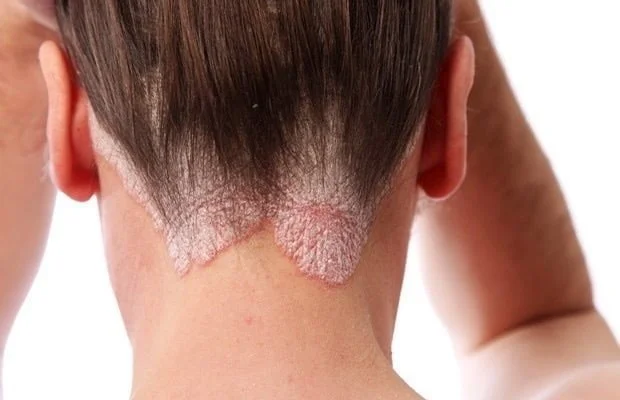Skip harsh shampoos or ointments and try some natural solutions to ward off the fungal infection.
If your scalp has been itching uncontrollably with flaking skin and pus-filled boils, you may want to get yourself checked for scalp fungus.
The dead skin cells of your scalp may lead to the build-up of dirt and debris when they combine with oil and pollutants.
These not only clog your hair follicles, leading to folliculitis, but also cause fungal infections.
Lack of proper hair hygiene, infrequent washing, excess oiling or combing your hair regularly, or using harsh chemicals and dyes on your hair can increase the risk of a fungal scalp infection.
Continue reading to learn more about fungal scalp infections and some natural home treatments for the same.
What Is A Fungal Scalp Infection?
A scalp fungus infection, as the term suggests, is a fungal infection on the scalp. Certain types of harmless fungi exist on your skin.
When provided with appropriate environmental conditions, these fungi can multiply and cause an infection.
Fungal infections can occur anywhere on or inside the body. But they are more common on the feet, fingernails, and scalp.
Scalp fungal inflammation weakens the hair and could lead to hair breakage and partial alopecia or hair loss patches. Let’s take a look at the causes.
What Causes A Fungal Infection On The Scalp?
Candida is one of the most common types of fungus known to trigger infections. There are more than 20 species of Candida that have been identified. However, most Candida infections are caused by Candida albicans.
More than 1000 people in the US seem to die every year due to candida infection. According to the data, approximately 5,389 deaths have occurred due to this fungal infection in the United States during 2018–2021.
Some factors that can contribute to fungal growth on your skin and scalp are:
-
- Certain medical conditions
- An unhealthy diet
- Stress
- Presence of certain harsh chemicals in hair care products
- Lack of personal hygiene
- Cuts or injuries on the scalp
- Sharing towels or hairbrush with people who have fungus in the scalp
How do you know if you have a fungal scalp infection?
Signs And Symptoms
The common signs and symptoms of a fungal scalp infection are:
-
- A reddish or purplish rash on the scalp that may flake
- White flakes on the scalp that may also shed
- Pus-filled white or yellow boils on the scalp
- Soft, moist, and/or white patches on the scalp
Learn about the common types of fungus that may affect your scalp
Types Of Fungus On Your Scalp
Microsporum
It is a group of fungi that causes tinea capitis, a type of fungal infection of the scalp (1). This fungus can penetrate the sheath of the roots in the hair follicle and get into the hair shaft.
Tinea capitis can be inflammatory and non-inflammatory, and may even lead to hair loss.
Malassezia
It is a type of yeast that naturally occurs on the skin, including the scalp. It causes skin issues such as seborrheic dermatitis (also called dandruff when it occurs on the scalp), pityriasis versicolor, and Malassezia folliculitis (2).
You can treat it with antifungal and anti-inflammatory medicines recommended by a dermatologist.
Trichophyton
It is a common cause of fungal skin infections, including conditions like athlete’s foot, ringworm, and tinea capitis (scalp ringworm). Trichophyton infections typically manifest as itchy, red, and scaly skin rashes (1).
Most fungal infections can be treated easily using over-the-counter treatments in the form of shampoos, foams, and ointments. But if you are looking for natural alternatives to treat the infection, the list below may help.
8 Natural Remedies To Get Rid Of A Fungal Scalp Infection
-
- Apple Cider Vinegar
- Lemon
- Baking Soda
- Neem Oil
- Castor Oil
- Tea Tree Essential Oil
- Garlic
- Coconut Oil
Apple Cider Vinegar
Apple cider vinegar has antifungal properties (3). These properties may help in getting rid of the fungi causing the infection.
You Will Need
- 1 cup of apple cider vinegar (ACV)
- 2 cups of water
What You Have To Do
- Add a cup of ACV to two cups of water.
- Rinse your hair with this solution.
How Often You Should Do This
You can do this 2-3 times a week.
Lemon
Lemons are citrus fruits with antimicrobial activities that may help treat a fungal scalp infection (4).
You Will Need
- 1 teaspoon of lemon juice
- 1 cup of water
What You Have To Do
- Add a teaspoon of lemon juice to a cup of water.
- Mix well and rinse your scalp with this mixture before you take a shower. Leave it on for 10-15 minutes.
- Go about your regular shower routine.
How Often You Should Do This
You can do this 2-3 times a week.
Caution: Lemon has astringent properties that can dry out your scalp. Therefore, use it in the recommended quantity.
3. Baking Soda
Baking soda, or sodium bicarbonate as it is popularly known, exhibits antifungal activity
(5). Hence, it may help in treating scalp fungus.
You Will Need
- 1 tablespoon of baking soda
- 1 cup of water
What You Have To Do
- Add a tablespoon of baking soda to a cup of water.
- Mix well and add the solution to your shampoo.
- Massage it into your scalp for a few minutes.
- Rinse thoroughly with water.
How Often You Should Do This
You can do this multiple times a week.
4. Neem Oil
Neem oil exhibits antifungal activity due to the presence of nimonol (6). This can help in dealing with a fungal scalp infection.
You Will Need
- 2 teaspoons of neem oil
- 1 tablespoon of coconut oil
What You Have To Do
- Add two teaspoons of neem oil to a tablespoon of coconut oil.
- Mix well and apply it to your scalp and hair.
- Leave it on for at least 30-60 minutes before rinsing it off with a mild shampoo.
How Often You Should Do This
You may do this 2-3 times a week.
5. Castor Oil
Castor oil contains ricinoleate, which imparts powerful antifungal properties to it and can help you get rid of the fungi causing the infection (7).
You Will Need
- 1 tablespoon of cold-pressed castor oil
- 1 tablespoon of coconut oil
What You Have To Do
- Mix a tablespoon each of cold-pressed castor oil and coconut oil.
- Apply the mixture to the scalp. Spread the remaining oil onto the rest of your hair.
- Leave it on for 30 minutes or more.
- Rinse your hair with a mild shampoo and condition it.
How Often You Should Do This
You can do this 1-2 times a week.
6. Tea Tree Essential Oil
Tea tree oil exhibits antifungal actions and has membrane-altering effects on fungi (8).
You Will Need
- 3-4 drops of tea tree oil
- 1-2 tablespoons of sweet almond oil
What You Have To Do
- Add two to three drops of tea tree oil to one to two tablespoons of sweet almond oil.
- Mix well and apply it to your scalp and hair.
- Leave it on for 30-60 minutes and rinse it off with a mild cleanser.
How Often You Should Do This
Do this at least twice a week.
Caution: Tea tree oil is extremely potent. Hence, use in the recommended quantity and after diluting with a carrier oil.
7. Garlic
Garlic possesses significant inhibitory effects against fungi, which may be effective in treating a fungal scalp infection (9). These properties may help in getting rid of the fungi causing the infection.
You Will Need
- 2-3 cloves of crushed garlic
- 2 tablespoons of coconut or olive oil
What You Have To Do
- Crush two to three cloves of peeled garlic.
- Add the crushed garlic to two tablespoons of coconut/olive oil and heat it for 1-2 minutes.
- Strain the oil out.
- Apply the oil to the scalp and hair.
- Leave it on for 1-2 hours before rinsing it off with a mild shampoo.
How Often You Should Do This
You may do this 1-2 times a week.
Caution: Garlic may burn your scalp if left on for a long period. Do a patch test before using this remedy.
Coconut oil exhibits excellent antifungal activities and is also one of the best oils for healthy hair growth (10). These properties may help in getting rid of the fungi causing the infection.
You Will Need
1-2 tablespoons of coconut oil
What You Have To Do
- Massage coconut oil gently into your scalp. Leave it on for 1-2 hours.
- Rinse it off with a mild cleanser and condition your hair.
How Often You Should Do This
Do this at least once a week.
These remedies can help you in getting rid of the fungal infection in your scalp. But you may also have to make a few lifestyle changes to prevent the recurrence of the infection. The following prevention tips may help.
How To Prevent A Fungal Scalp Infection
- Bathe regularly and practice healthy hygiene.
- Keep your scalp dry and clean.
- Follow a well-balanced and healthy diet.
- Limit your intake of starchy and sugary foods.
- Limit alcohol intake.
- Do not go overboard with antibiotics and steroids.
- Allow your scalp to breathe by limiting the use of hats, caps, or scarves.
Alex Kouras, a fitness and lifestyle blogger, shared his personal journey with dandruff in a video. He said, “Removing yeast and grains from my nutrition has helped me cure ninety percent of my dandruff and seborrheic dermatitis with nearly immediate results (i).” This dietary change lead to reduced scalp itchiness, flakes, and redness.
While scalp infections are quite common, they are also easily treatable. Following the remedies discussed above regularly and taking the required precautions can not only treat the infection but also prevent its recurrence.





